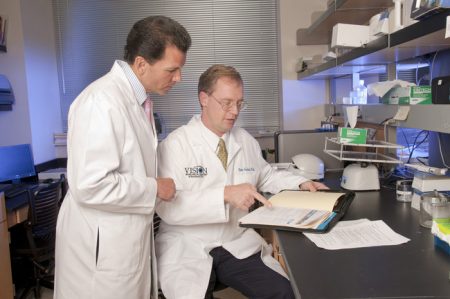By Jean Peat
Situated prominently on the corner of 21st and Charlotte is UMKC’s Department of Ophthalmology and Vision Research Center, a bustling center of excellence within UMKC’s new Health Sciences District. Yet, despite the cutting-edge research and advanced academics taking place under its roof, many are unaware of the critical position it plays in improving the treatment of eye disease for people in our community and beyond.
Nelson Sabates, MD, Professor and Chairman of the Department of Ophthalmology and Co-Director of the Vision Research Center, is working to heighten the facility’s recognition and its continued efforts to offer the most advanced academic environment for teaching the next generation of ophthalmologists.
Two recent gifts from donors, one from the estate of Mary Adams and the other from an anonymous contributor, are helping to make this goal possible by supporting basic science research being conducted by two UMKC faculty members, Peter Koulen, Ph.D., and Karl Kador, Ph.D.
“These gifts will have a significant impact on our ability to provide newer and longer lasting treatments for patients diagnosed with glaucoma, macular degeneration and diabetic retinopathy,” says Dr. Sabates. “We are grateful to have been chosen by these donors as the recipients of their generous contributions to our mission of ensuring patients receive the most advanced medical treatments available.”
Both researchers are working to develop new therapy approaches urgently needed by physicians worldwide to better diagnose, prevent, and treat eye disease and vision disorders.
Dr. Koulen, the Felix and Carmen Sabates Missouri Endowed Chair in Vision Research and Director of Basic Research at the Vision Research Center, focuses on therapy development for chronic diseases of the eye and brain. Dr. Kador’s research focuses on creating three-dimensional models of the retina that can be used to understand how retinal ganglion cells (RGCs) integrate and form synapses (the point at which a nervous impulse passes from one neuron to another) with their binding partners within the retina. He and his lab are working to develop a functional cell source and transplantation method to treat optic neuropathies such as glaucoma and optic nerve stroke.
“Having an endowed chair in vision research has been instrumental in our ability to conduct research at UMKC and, in order to continue moving forward, we need to raise additional funds for a second endowed chair,” says Dr. Sabates.
Dr. Sabates will join the UMKC Foundation Board of Directors in July and is resolute in seeing a new health sciences building become a reality.
“I, along with many others, am a true advocate for advancing UMKC’s combined health sciences with a modern, functional space where faculty and students can have access to the latest technologies,” he says. “I am excited to be a voice for the health sciences arena at UMKC.”
Built on a 50-year history, UMKC’s Department of Ophthalmology and the Vision Research Center look to opportunities for future growth in research, education, prevention, treatment and outreach.
“This is a special place where everyone is truly committed to taking care of people,” says Dr. Sabates. “We will continue to strive to be the best – for our patients and community – by providing a direct avenue for translational research and educational excellence.”

